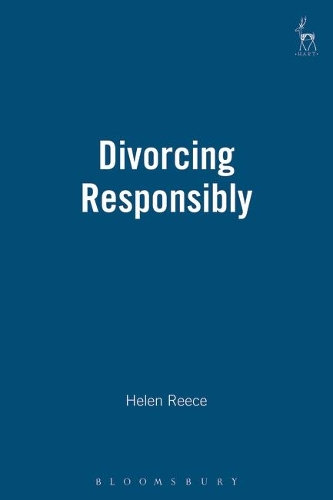
Divorcing Responsibly
Publishing Details
Divorcing Responsibly
By (Author) Helen Reece
Bloomsbury Publishing PLC
Hart Publishing
15th August 2003
United Kingdom
Classifications
Tertiary Education
Non Fiction
346.410166
Winner of Socio-Legal Studies Association Book Prize 2004 (UK)
Physical Properties
272
Width 138mm, Height 216mm, Spine 21mm
Description
This study provides an analysis of the increasing impact on the law in general and divorce law in particular of post-liberalism, which replaces choice with self-discovery. The author shows that post-liberal premises formed the foundation for every aspect of the recent divorce reform proposals. Accordingly, she attributes their failure to the contradictions inherent within post-liberalism. Nevertheless, she concludes that post-liberalism maintains a subtle yet pervasive influence on the law. Specifically, this means that we are held accountable not for what we do but for how we approach our decisions. Thus, for the first time ever, it has become possible to divorce responsibly.
Reviews
This is a fascinating book. It is immensely well-researched, painstakingly argued and always perceptive[It] can be recommended to anyone interested in contemporary political theory, to students of social policy, to those interested in the limits of law and, of course, to family lawyers. -- Michael Freeman * The Modern Law Review, Vol 69, No 1 *
...provides both a sustained journey through theory (liberal, feminist, lesbian, communitarian, post liberal) and a journey through the new divorce law. -- Susan B. Boyd * International Journal of Law in Context *
Her [Reece] anaylsis of the different theoretical arguments is masterly... -- Rebecca Probert, University of Warwick * International Journal of Law, Policy and the Family *
This book is informative, thoughtful and well-researched. -- Shelley Day Sclater * Times Higher Education Supplement *
Reece provides a meticulous and scholarly examination of contemporary theoretical writing on the nature of liberal and 'post-liberal' society, including communitarianism and feminism, and makes a compelling case that the Family Law Act 1996 contains the features identified in this analysis. She writes with great clarity and insight, and presents a powerful argument which will be a major tool for a critical understanding of modern family policy. -- John Eekelaar * Journal of Law and Society *
Author Bio
Helen Reece is a Barrister and Reader in Law at Birkbeck College London.
